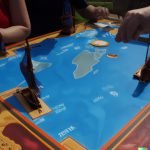Mancala Strategy Board Games have been enjoyed for centuries, captivating players with their blend of skill, strategy, and excitement. Originating in Africa, Mancala games encompass a variety of traditional board games that involve the strategic movement of pieces across a unique game board. Players young and old are drawn to the challenge and entertainment these games provide.
Dating back to ancient times, the history of Mancala games is rich and diverse, evolving over the years into different variations and regional adaptations. Despite the cultural differences in gameplay, one thing remains constant – the objective of capturing more stones or seeds than your opponent. Understanding this goal is essential to mastering the nuances of each game and developing effective strategies for success.
With a wide range of Mancala board game types and variations available around the world, there is no shortage of options for players looking to expand their skills and explore new challenges. From traditional wooden boards to modern online versions, each variation offers its own unique twist on the classic gameplay. Whether playing Oware in Ghana or Kalah in America, the fundamental rules and strategies remain universal, making Mancala games accessible to players everywhere.
History of Mancala
Origins of Mancala
The origins of Mancala can be traced back thousands of years to ancient Africa and the Middle East. The game is believed to have originated in Egypt, where archaeological evidence of a precursor to Mancala was found in the form of gaming boards dating back to around 1400 BC. From Egypt, the game spread throughout Africa and eventually made its way to other parts of the world through trade and cultural exchange.
Evolution of Mancala
As Mancala travelled across different regions, it underwent various adaptations and evolved into different versions. Each culture that adopted the game added its own unique twist, leading to a wide variety of Mancala board games that exist today. For example, in Ethiopia, they play a version called “Tegel Ade,” while in Ghana, they have a version known as “Oware.” Despite these variations, the core gameplay principles remain similar across all versions of Mancala.
Mancala’s Cultural Significance
Over time, Mancala became more than just a form of entertainment-it also became a tool for teaching mathematical concepts, fostering social interactions, and preserving cultural traditions. In many African societies, playing Mancala was not only a pastime but also a way to pass down ancestral knowledge and values from one generation to the next. Today, Mancala continues to hold cultural significance in many communities worldwide and is celebrated for its ability to bring people together in friendly competition.
Understanding the Objective of Mancala
Mancala is a traditional strategy board game that has been enjoyed by many cultures for centuries. The objective of Mancala is simple yet engaging, making it a popular choice for players of all ages. In Mancala, the primary goal is to accumulate more stones or seeds in your store than your opponent by the end of the game.
Goal of the Game
The main objective of Mancala is to strategically sow and collect stones or seeds to capture as many as possible during gameplay. Players take turns picking up and redistributing stones around the pits on the game board, with the aim of ultimately collecting more seeds in their store than their opponent. This requires careful planning, forward thinking, and adaptability to anticipate and react to your opponent’s moves effectively.
Importance of Capturing Stones
Capturing stones from your opponent’s pits is a key aspect of winning in Mancala. By strategically moving your pieces and capturing your adversary’s seeds, you can gain a significant advantage in terms of both points and control over the board. However, it is essential not only to focus on capturing stones but also on safeguarding your own seeds to prevent your opponent from taking advantage of vulnerable positions on the board.
Strategic Thinking
To excel at Mancala, players must develop strategic thinking skills such as pattern recognition, spatial reasoning, and critical thinking. By analyzing different potential moves and predicting their outcomes, players can formulate effective strategies to outmaneuver their opponents. With each move impacting future possibilities, mastering the strategic depth of Mancala can lead to a fulfilling gameplay experience that rewards thoughtful planning and tactical decision-making.
Types of Mancala Board Games and Variations
Mancala is a traditional strategy board game that has been played for centuries across different cultures and regions. As the game spread, various versions and variations emerged, each with its own unique rules and gameplay. Here are some of the most popular types of Mancala board games and their variations:
1. Kalaha: Kalaha is one of the most well-known variations of Mancala, often played in North America. The game is played on a board with two rows of six pits each and a larger storehouse at either end. The objective is to capture more stones than your opponent by strategically moving them around the board.
2. Oware: Oware is another widely played version of Mancala, especially in Africa and the Caribbean. The game is typically played on a wooden board with 12 small pits arranged in two rows, with each player controlling one row. Oware requires careful planning and foresight to outwit your opponent.
3. Bao: Bao is a popular variant of Mancala in East Africa, particularly in Tanzania and Kenya. The game is played on a unique rectangular board with four rows of eight pits each and special rules for capturing stones. Bao is known for its complexity and deep strategic gameplay.
4. Congklak: Congklak is a variation of Mancala that originated in Indonesia and Malaysia. The game is traditionally played on a carved wooden board with numerous small pits filled with seeds or shells as playing pieces. Congklak requires quick thinking and adaptability to succeed.
Each type of Mancala board game offers a distinct playing experience, challenging players to think critically and plan their moves carefully to outmaneuver their opponents. Whether you prefer the simplicity of Kalaha or the intricacy of Bao, exploring different variations can enhance your understanding of this timeless strategy game.
Rules and Gameplay of Mancala
Mancala is a fascinating and ancient strategy board game that has entertained people for centuries. The rules and gameplay of Mancala are relatively straightforward, making it accessible to players of all ages. The game typically consists of a wooden board with multiple small pits or cups, as well as gems, stones, or seeds used as playing pieces.
To begin the game, the board is placed horizontally between the two players, with each player controlling one half of the board and the corresponding six pits. The objective of Mancala is to capture more stones or seeds than your opponent by strategically moving them around the board. Players take turns scooping up all the pieces from one pit on their side and dropping them into subsequent pits in a counterclockwise direction.
The strategic complexity of Mancala lies in deciding which pit to pick up pieces from and where to sow them next. Players must carefully plan their moves to maximize their captures while also trying to disrupt their opponent’s plans.
By using tactics such as forcing opponents to skip turns by emptying certain pits or setting up opportunities for large captures, players can gain an edge in the game. Mastering these strategies is essential for success in Mancala games and can lead to thrilling victories.
Tips and Strategies for Winning Mancala Games
Mancala is a fascinating strategy board game that has been played for centuries, challenging players to think strategically and anticipate their opponent’s moves. To excel in Mancala, one must carefully plan each move to ensure they come out on top. Here are some tips and strategies for winning Mancala games:
- Understand the concept of capturing: In Mancala, capturing your opponent’s stones can give you a significant advantage. Try to set up your board in a way that allows you to capture your opponent’s stones while also protecting your own.
- Focus on the end game: The goal of Mancala is to have more stones in your mancala (the larger scoring pit) than your opponent by the end of the game. Keep an eye on the number of stones in both players’ mancalas and strategize accordingly as you approach the final moves.
- Pay attention to the sow rule: In Mancala, when you drop a stone into an empty pit on your side of the board, you get to capture all the stones in the opposite pit. Use this rule to your advantage by setting up moves that allow you to sow strategically and potentially capture more stones from your opponent.
Mastering these tips and strategies can help improve your overall gameplay in Mancala strategy board games. By thinking ahead, planning your moves carefully, and adapting to your opponent’s gameplay, you can increase your chances of emerging victorious in this classic and engaging game. Happy playing.
Benefits of Playing Mancala for Mental Skills
Mancala strategy board games offer more than just entertainment; they also provide a range of mental benefits for players. One key advantage of playing Mancala is the enhancement of critical thinking skills.
As players navigate the game board and make strategic decisions on how to distribute their stones, they are constantly exercising their ability to analyze different outcomes and anticipate their opponent’s moves. This process helps to sharpen problem-solving skills and strategic thinking, which are valuable assets in various aspects of life.
Moreover, playing Mancala can improve cognitive skills such as memory and concentration. The game requires players to keep track of the number of stones in each pit, remember previous moves, and plan ahead for future turns. This constant mental engagement can help boost memory retention and focus over time. By regularly playing Mancala, individuals can train their minds to stay sharp and attentive, enhancing their overall cognitive abilities.
Another mental skill that can be developed through playing Mancala is decision-making under pressure. As the game progresses and the board state changes rapidly, players must quickly assess their options and make strategic decisions within a limited time frame.
This ability to think fast and make effective choices in high-pressure situations can translate into improved decision-making skills in real-life scenarios as well. Overall, engaging with Mancala strategy board games not only provides entertainment but also serves as a valuable tool for enhancing mental skills important for daily life challenges.
Mancala in Popular Culture
Mancala, a traditional strategy board game with roots dating back thousands of years, has made a significant impact in popular culture. Over the years, Mancala has gained recognition not only for its gameplay but also for its influence on various aspects of society, including art, literature, and even technology. The game’s simple yet challenging mechanics have captured the interest of players worldwide, leading to its widespread adoption and adaptation across different platforms.
One notable example of Mancala’s influence in popular culture is its appearance in various forms of media such as movies, television shows, and books. Whether showcased as a pivotal plot point or simply as a background element, Mancala has found its way into mainstream entertainment, further solidifying its status as a beloved pastime. Additionally, the strategic nature of the game has often been used metaphorically to represent themes of decision-making and foresight in storytelling.
In the realm of technology, Mancala has not been left behind either. With the advent of digital gaming platforms and mobile applications, this classic board game has undergone a modern transformation to reach new audiences. Players can now enjoy virtual versions of Mancala on their smartphones or computers, providing a convenient way to engage in strategic gameplay anytime and anywhere. This digital adaptation has helped introduce Mancala to younger generations and ensures its relevance in contemporary popular culture.
| Mancala Influence | Legacy |
|---|---|
| Movies | Art |
| Television Shows | Literature |
| Mobile Applications | Technology |
Conclusion
In conclusion, Mancala strategy board games have stood the test of time and continue to captivate players around the world with their simple yet engaging gameplay. The roots of Mancala can be traced back through centuries of history, showcasing its enduring appeal and ability to transcend cultural boundaries. The objective of Mancala is clear-cut – to outsmart your opponent by employing strategic moves and calculated decisions, making each game a thrilling mental exercise.
With various types and variations of Mancala available, players can explore different approaches and tactics to keep the gameplay fresh and exciting. Understanding the rules and nuances of each variant is key to mastering the game, but it’s the tips and strategies that truly separate the novice from the expert. By honing their skills in planning ahead, anticipating opponents’ moves, and maximizing their captures, players can increase their chances of claiming victory in this timeless board game.
Beyond just entertainment, playing Mancala offers numerous benefits for mental skills such as critical thinking, decision-making, and spatial awareness. It challenges players to think strategically while also fostering social interaction and friendly competition.
As Mancala continues to leave its mark on popular culture through references in books, movies, and even video games, it solidifies its legacy as a classic pastime that will endure for generations to come. So next time you gather around a Mancala board with friends or family, remember that you’re not just playing a game – you’re partaking in a tradition that has fascinated minds throughout history.
Frequently Asked Questions
What Is the Best Strategy for Mancala?
The best strategy for Mancala involves carefully planning your moves, considering both short-term gains and long-term benefits. It’s important to focus on controlling the board, creating opportunities for capturing your opponent’s pieces, and managing your own resource distribution efficiently.
What Is the Best First Pick in Mancala?
In Mancala, the best first pick typically involves selecting a move that gives you immediate control over one of the larger pits on your side of the board. By prioritizing this kind of initial move, you set yourself up for better positioning and potential capture opportunities as the game progresses.
Is Mancala a Skill or Luck?
Mancala is a game that combines elements of skill and luck. While luck plays a role in the initial setup of the board and the distribution of stones, skill comes into play through strategic decision-making, predicting your opponent’s moves, and adapting your tactics based on changing circumstances during gameplay.
Ultimately, success in Mancala requires a balance of both skillful gameplay and calculated risk-taking.

I love playing all kinds of games – from classics like Monopoly to modern favourites like Ticket to Ride.
I created this blog as a way to share my love of board games with others, and provide information on the latest releases and news in the industry.





